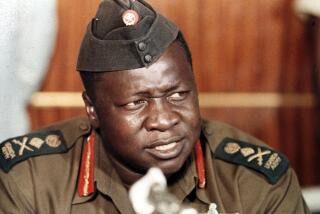S. Africa Officers May Seek Amnesty in Biko Slaying
- Share via
JOHANNESBURG, South Africa — In a dramatic breakthrough, officials said Monday that five former security police officers are expected to seek amnesty in the 1977 beating death of celebrated black leader Steven Biko, the most notorious death in police custody of the apartheid era.
Biko headed the Black Consciousness Movement and at the time was arguably South Africa’s best-known political dissident. His death in detention prompted worldwide outrage and was instrumental in the imposition of U.N. arms and oil sanctions against Pretoria’s white minority regime.
Phila Ngqumba, a spokesman for the nation’s Truth and Reconciliation Commission, said the panel was recently approached by lawyers representing five former officers who want to apply for amnesty in the slaying of the legendary anti-apartheid activist.
It would be the first admission of wrongdoing in the case by security officers of the apartheid regime, although it is still not clear to what the men might confess.
The commission, created to deal with South Africa’s violent past, has the power to grant immunity from prosecution to anyone who confesses to having committed politically motivated human rights abuses and other crimes before May 10, 1994, when Nelson Mandela was inaugurated after winning the country’s first all-race presidential election.
Biko’s death on Sept. 12, 1977, made him a symbol and martyr of apartheid-era barbarity. A former medical student, Biko was a charismatic speaker and prolific author who infuriated white authorities by urging blacks to reject white supremacy and embrace self-reliance.
His fame far exceeded that of Mandela, who then was imprisoned and whose earlier leadership of the black resistance movement was overshadowed during the nationwide riots sparked by the 1976 Soweto student uprisings.
Donald Woods, a former newspaper editor whose friendship with Biko and whose subsequent escape from South Africa were dramatized in the 1987 film “Cry Freedom,” said Monday that Biko “would have played a central role in the new South Africa.”
“He was a brilliant man,” Woods said. “He would have been right at the center of things.”
Woods said the five former security police reportedly preparing to seek amnesty were among those who interrogated and allegedly beat Biko, 30, after he was arrested at a roadblock and detained at security branch headquarters in Port Elizabeth. Despite severe injuries, Biko was thrown naked on the metal floor of a Land Rover and driven nearly 700 miles to Pretoria, where he died in a police cell.
The five officers are retired Col. Harold Snyman, who led the interrogation team; retired Lt. Col. Gideon Nieuwoudt; Ruben Marx, then a security branch warrant officer; Johan Beneke, another warrant officer; and then-Capt. Daantjie Siebert.
Francois Jacobus van der Merwe, a Port Elizabeth lawyer representing several of the men, said Monday that the amnesty applications are confidential and that he could not discuss their contents. “This is a very sad story,” he said in a telephone interview. “This involves so-called human rights abuses, and there are families involved on both sides.”
Until his family can meet and discuss the news, Nkosinathi Biko, Biko’s eldest son, declined to comment in a telephone interview. He said his family opposes amnesty for his father’s killers.
The Bikos and two other prominent victims’ families filed a lawsuit last year in an attempt to revoke the commission’s authority to preempt trials of suspected killers. South Africa’s highest court rejected the case, saying political amnesty is essential for national reconciliation.
A government inquest two months after Biko’s death officially found that he died from brain injuries caused by a fall against a wall after he supposedly went “berserk” and attacked the five officers. The inquest--which government opponents here and abroad widely denounced as being rigged--exonerated police in Biko’s death.
The commission has granted amnesty to only 11 people so far of the almost 4,500 who have applied--most of them incarcerated criminals. In hopes of persuading former security force members and other officials from the old order to apply, the panel recently signaled that even the most horrific crimes may be forgiven.
In a controversial decision last month, the panel pardoned a white police commander serving a 30-year sentence for the massacre of 11 women and children in 1988. The officer, Brian Mitchell, was immediately freed.
Analysts here said Mitchell’s release may set a precedent for right-wing extremists who tried to derail the 1994 elections with a terrorist bombing campaign.
More to Read
Sign up for Essential California
The most important California stories and recommendations in your inbox every morning.
You may occasionally receive promotional content from the Los Angeles Times.











